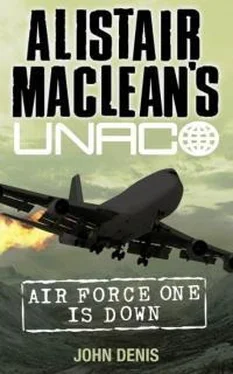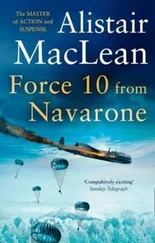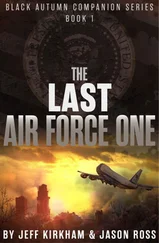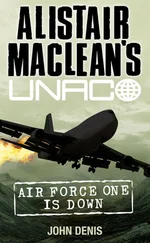He stepped out into the Piazza Barberini, and a long, dark blue NATO staff-car, a flag fluttering from the apex of its bonnet, drew up alongside him. Philpott got in, and the car pulled away.
Myshkin took another careful pull at the Cuban cigar, deprived it of its nose-cone of ash, then dropped the still-light butt to the ground, and stepped on it as he walked out into the square. A black Zil limousine, Soviet flag fluttering at the apex of its bonnet, purred at his heels. He turned, and the door swung open …
At five minutes after ten, the telephone rang in the NATO Ops room, and Smith said, ‘Two hours, Mr Philpott, not a second more.’
‘You have my word,’ Philpott replied, careful not to identify the caller with Tomlin at his shoulder. ‘It merely allows for certain formalities to be completed.’
‘No tricks, Philpott,’ Smith warned. ‘Not only the Americans and Arabs, but your estimable Sabrina Carver, are at my mercy, remember.’
‘True,’ Philpott conceded, ‘though I am confident you will not harm them. You must know by now – from Dunkels, I imagine – that my friend the erstwhile security chief of Air Force One has escaped from custody in Bahrain. He was the only card in your hand in which the Russians could be remotely interested. They will not, I know, look with any enthusiasm on your failure to hold him for their interrogators. No doubt you have concocted some story to mollify them in the meantime, but they would believe me if I told them he had escaped, Smith. I don’t think you would wish them to know that.’
‘Hence my agreement to your request for a delay,’ Smith answered. ‘Use the time wisely, Mr Director.’
‘I intend to,’ Philpott said, glancing up at Tomlin.
As far as McCafferty could judge, the Kamov pilot must be following orders in flying low to escape radar detection. Mac throttled back so he could more sensibly use his high vantage-point to monitor Dunkels’ progress. Clearly, the helicopter was also intent on avoiding even the smallest village, let alone any larger centre of human habitation.
The American decided that, given all the precautions the Kamov pilot was taking, he would also be aware that the only source of danger to him must come from above, and would be keeping his eyes peeled. The place for anyone intent on secret pursuit was behind and below the helicopter, Mac thought.
Chopping the power in his own machine, Mac put on a bootful of rudder, pulled the stick over, and side-slipped towards the ground. He took up straight and level flight again at about fifty feet, and some quarter of a mile behind the little Kamov, which was literally skimming the treetops.
For the next hundred miles or so, McCafferty effectively saw nothing save the series of greens and browns which flashed across the periphery of his vision. He was concentrating on the steel-grey body of the Kamov as it flew up shallow valleys, danced over hilltops, flirted with the crests of tall forest trees, and buzzed the surfaces of a dozen sapphire-blue lakes.
An hour and a half went by with McCafferty fighting to balance elevator, rudder and aileron, opening and closing the throttle a thousand times in an effort to stay hidden while keeping contact with a target whose speed fluctuated between ninety miles per hour (which was easy for Mac to parallel) right down to under fifty miles per hour. This was a trickier proposition, for it brought the UTVA to the point of stall, where she wallowed with slack controls and insufficient height to recover from the effect of even a slight mistake by her pilot. The sweat coursed down his face, and his language matched the blue of the sky and waters.
Suddenly the ground started to rise steeply. Mac’s altimeter showed twelve hundred feet more than the zero which he had set before his departure from the low-lying airfield near Gora. He looked anxiously ahead. Still in front of him were mountain peaks that seemed fifteen or sixteen hundred feet higher. He snatched a quick peep at the map crumpled over in front of him and identified the Dinaric Alps.
When he looked back the Kamov had vanished.
McCafferty fought his momentary panic and quelled it. The helicopter, he reasoned, couldn’t simply have disappeared from view, or sunk out of sight into the ground. His first instinct was to slam the throttle open and surge forward as fast as possible, but instinct and caution held him back. The Kamov was still there somewhere, he told himself; Mac’s problem was that he couldn’t see it.
He wound the UTVA into a steep, spiralling climb to overfly the ground before him without attracting attention. Four thousand feet of extra height registered on the dial in a little over three minutes, and then Mac resumed his original course. He peered to starboard, his eyes exploring the rocky terrain.
Then he grinned and said, ‘Hot diggety.’
The mystery was solved. The helicopter had vaulted the edge of a natural glacier-formation and slipped into the steep valley below it. The valley was a thumbprint amid the sharp, pointed mountains, and there was a grassy tree-fringed platform set into the hillside at the top of a winding road.
Facing this natural ledge, which started off as barely a smudge but grew to respectable proportions in Mac’s view, was a castle, perched precariously against a dent in the mountain.
At a slightly lower level, a flat area had been gouged out of the rock and smoothed over. The Kamov rested on it, the rotor blades turning at no more than walking pace.
Siegfried Dunkels had arrived at his destination …
An aide bustled into the NATO computer complex and asked for Philpott. Directed with an irritable wave by a red-haired American major, the courier whispered to the UNACO chief that transport was waiting to take him to Leonardo da Vinci for the Zagreb flight. Philpott was busy receiving Sonya’s assurances that the diamonds were being assembled and dispatched in the care of a leading member of the Amsterdam Diamond Exchange, and at the same time coping with Tomlin’s obvious keenness to impress UNACO with his obvious keenness.
‘I’ve also scrambled a squadron of P-90s to square-search beaches, salt flats – any open ground that could take a 707,’ the Brigadier expatiated.
‘Yugoslavian beaches?’ Philpott asked in astonishment. ‘She’s not a member of NATO, you know, Brigadier.’
Tomlin glared like a cornered schoolboy coming out of a strip club.
‘I am aware of that, sir,’ he snapped, ‘and although we appear merely to be including Yugoslavia in the search area on a casual basis – taking it in along with Italy, Sicily, Greece and the islands, Corfu and the Albanian coast – I have at least established contact with the Yugoslav authorities and explained the problem, of which, naturally, they are aware since the news broke in their own country. They also suspect that Air Force One and its captives are in Yugoslavia, and–’
‘And so they think you’re just wasting aviation fuel looking anywhere else, but at the same time they’re not inviting you in. That it, Brigadier?’
‘Something like that, sir,’ Tomlin mumbled.
‘So that’s why I’m going to Zagreb,’ Philpott supplied, ‘because whereas they don’t want NATO trampling all over their beautiful country, they’ll accept – they’re bound to, by their membership – a small UNACO contingent.’
Tomlin then confessed, with a sheepish grin, that his pilots had been instructed not to be over-conscientious in their search of areas outside Yugoslav air-space.
‘We shan’t be wasting too much fuel, sir,’ he added, ‘if only because we’ve no real idea where you could hide an aircraft that big.’
Philpott stopped putting papers into a brief-case and favoured the soldier with a sympathetic but knowing look.
Читать дальше
Конец ознакомительного отрывка
Купить книгу










